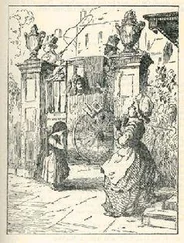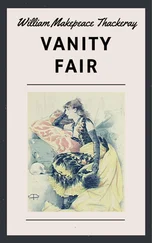Eleanor Brainerd - In Vanity Fair - A Tale of Frocks and Femininity
Здесь есть возможность читать онлайн «Eleanor Brainerd - In Vanity Fair - A Tale of Frocks and Femininity» — ознакомительный отрывок электронной книги совершенно бесплатно, а после прочтения отрывка купить полную версию. В некоторых случаях можно слушать аудио, скачать через торрент в формате fb2 и присутствует краткое содержание. Жанр: foreign_antique, foreign_prose, на английском языке. Описание произведения, (предисловие) а так же отзывы посетителей доступны на портале библиотеки ЛибКат.
- Название:In Vanity Fair: A Tale of Frocks and Femininity
- Автор:
- Жанр:
- Год:неизвестен
- ISBN:нет данных
- Рейтинг книги:5 / 5. Голосов: 1
-
Избранное:Добавить в избранное
- Отзывы:
-
Ваша оценка:
- 100
- 1
- 2
- 3
- 4
- 5
In Vanity Fair: A Tale of Frocks and Femininity: краткое содержание, описание и аннотация
Предлагаем к чтению аннотацию, описание, краткое содержание или предисловие (зависит от того, что написал сам автор книги «In Vanity Fair: A Tale of Frocks and Femininity»). Если вы не нашли необходимую информацию о книге — напишите в комментариях, мы постараемся отыскать её.
In Vanity Fair: A Tale of Frocks and Femininity — читать онлайн ознакомительный отрывок
Ниже представлен текст книги, разбитый по страницам. Система сохранения места последней прочитанной страницы, позволяет с удобством читать онлайн бесплатно книгу «In Vanity Fair: A Tale of Frocks and Femininity», без необходимости каждый раз заново искать на чём Вы остановились. Поставьте закладку, и сможете в любой момент перейти на страницу, на которой закончили чтение.
Интервал:
Закладка:
CHAPTER III
THE FAMOUS ATELIERS
The dressmaker of Paris is an artist. Granted that, it is quite natural that his workroom should be an atelier. Your true artist works in a studio, not in a shop; and when one speaks of the famous ateliers of the Parisian dressmaking world, one but gives the work done in these establishments its due recognition.
But they are "magasins" as well as ateliers, those establishments in which fashions are made, and business plays quite as important a part in them as does art, though even the business in some of its phases approximates the dignity of a fine art.
The saleswoman of the great dressmaking establishment is certainly an artist in her line, and perhaps it would not be speaking extravagantly to call her the shrewdest business woman in the world. She is the chief figure in that department of the establishment which meets the public eye and which is designated as the front. Upon her depends the successful disposal of the creations which are tediously evolved behind the closed doors, and her work calls for no ordinary ability. Her knowledge of things Parisian is equalled only by her knowledge of human nature, her suavity is equalled only by her diplomacy. Her siren song would make the mermaiden's melodies sound like a hurdy-gurdy. She could sell a ten-thousand-dollar sable coat to the savage owner of a hut on the equator – provided she knew that the savage would be good for the ten thousand dollars. And she would know. That's the amazing thing about her. She always does know, or if she doesn't, she finds out by some lightning quick process painless to the customer. She makes no mistakes, this soft-voiced, smiling, carefully groomed, persuasive woman, and yet there is such opportunity for mistake in Paris. It is not only a question of knowing the financial rating of the husband of Madame A, or of the Countess B. The credit system of a Parisian dressmaking house is a more complicated thing than that. When Mademoiselle Blanche of the Scala, at fifty francs a week, drives up in a luxurious carriage, with coachman, footman, maid, and poodle all in attendance, sweeps into the show rooms and begins talking of five-thousand-franc gowns, the saleswoman shows no surprise. She only wonders and then adroitly institutes a search for the explanation. The chances are that she can get the story from Blanche herself, by dint of diplomatic wheedling and flattery. If not – well, there are other ways of finding out before the material is cut.
And when everyone knows that the Grand Duke has loved and ridden away from Antoinette of the Folies Bergère, yet Antoinette turns up smiling and places extravagant orders, one must not be too hasty. A grand duke may be succeeded by a rich banker. Even if there is no visible guarantee of the bills, the little woman should not be angered. The future may hold other grand dukes.
Not highly moral, these calculations, but supremely Parisian. Business is business, and Parisian business is adapted to Parisian conditions. The dressmaker does not concern himself about the source from which the money floods his tills, so long as the money is forthcoming, and tainted money scruples would sadly demoralize the business prosperity of the Rue de la Paix.
There are black books in the great dressmaking establishments and queer things are entered in them, items of information that would furnish spicy running commentary upon Parisian life. The incomes of Monsieur's customers are so often fluctuating things. Even in the beau monde there may be circumstances not generally understood, and, where no touch of scandal enters into the calculations, still there is room for mistake. Fortunes may rest on tottering foundations, appearances are often misleading. Yes, there is much to confide to the black book, and the dressmakers interchange statistics in right comradelike fashion. There are men employed whose business it is to investigate all matters having a bearing upon the financial condition of the women who make up the clientèles of the famous dressmakers, and it might surprise some of the gay butterflies that flutter into the luxurious salons of the dressmaking establishments to know how thoroughly informed concerning their private affairs are the saleswomen who wait upon them and the "master" who caters to their whims.
The saleswoman is as clever in dealing with Miss Millions from Chicago as with the irrepressible Toinette. She flatters so subtly, influences so insensibly, makes herself so indispensable. Madame must never be made to feel that her own taste is bad, but she must, if possible, be guided to wise selection, persuaded to believe that she herself has decided upon the frock she finally chooses. It is to the interest of the house that every woman who buys her frocks there should look her best. Moreover, the woman whose friends praise her clothes will hold fast to her dressmaker, so the saleswoman does her best, and unless the customer is very obstinate, that best is surprisingly good. If necessary, with an old and valued customer the diplomat can be firm, suavely, politely firm.
"Why have I no black gown on the list?" asks Madame, after studying the plan of her season's outfit as made out by Mademoiselle Therèse.
Mademoiselle smiles, a deprecatory little smile, but her reply is prompt.
"We find that this year Madame is not of an age to wear black," she says simply, sweetly, but with a finality in her tones.
Madame colours, looks resentful, Mademoiselle busies herself with orders to a mannequin. The pause is ended by a sigh of resignation.
"Oui, c'est vrai," admits Madame. "There is an age, and there is again an age, but in between – eh, bien, it is true. We must now be careful, Therèse."
The successful saleswoman gains the confidence of her customers, holds them, brings millions of francs' worth of business to her employer, and receives a commission on all sales. One saleswoman, among the best in her class, makes as much as fifteen thousand dollars a year out of her commissions, and, though this is exceptional, all earn good incomes.
The mannequins or models are the secondary features of the "front"; but they are of little importance compared with the saleswomen; and while it is a difficult thing to replace a good saleswoman, satisfactory mannequins may be had for the asking.
They are usually recruited from the ranks of the errand girls who swarm in all of the large dressmaking establishments, and are a sharp-witted, precocious set of gamins wise in the gossip of the atelier which is the gossip of all Paris. One of these girls grows up into a good-looking young woman with an admirable figure, a forty-four-inch skirt length, a twenty-one-inch waist, and a soaring ambition. She attracts the attention of the powers that be and is transplanted from her inconspicuous place behind the scenes to the full glare of the front. No more trotting about in pursuit of elusive colours and materials, no more delivering messages and frocks at all hours and in all weathers, no more being a shabby little atom of humanity at everyone's beck and call. Henceforward it is her sole duty to be chic, to wear with an air that will lend cachet to the creations any frocks or wraps which the saleswoman wishes to show.
Much of the talk concerning the transcendent charms of the Paris mannequins is great nonsense, and the sensational tales of these humble beauties and their spectacular marriages – or "arrangements," are, as a rule, pure fabrication. There are handsome girls among them, and one and all they have the French talent for wearing smart clothes; but their good looks are largely a matter of make-up and of those same smart clothes. A more ordinary looking group of girls than the mannequins of a house, when they arrive in the morning, it would be hard to find, but a half hour in a toilet room works a transformation, and when Mademoiselle, perfectly corsetted, skilfully made up as to complexion, eyes, and brows, with her hair dressed in the latest fashion, her hands and nails beautifully cared for, her feet clad in dainty high-heeled slippers, sweeps across the show room wearing a frock that is a dream of beauty – then one understands how the traditions concerning her have arisen. She is not beautiful perhaps, but one forgets it, for she is excessively chic, and being that she fulfils the French law and gospel.
Читать дальшеИнтервал:
Закладка:
Похожие книги на «In Vanity Fair: A Tale of Frocks and Femininity»
Представляем Вашему вниманию похожие книги на «In Vanity Fair: A Tale of Frocks and Femininity» списком для выбора. Мы отобрали схожую по названию и смыслу литературу в надежде предоставить читателям больше вариантов отыскать новые, интересные, ещё непрочитанные произведения.
Обсуждение, отзывы о книге «In Vanity Fair: A Tale of Frocks and Femininity» и просто собственные мнения читателей. Оставьте ваши комментарии, напишите, что Вы думаете о произведении, его смысле или главных героях. Укажите что конкретно понравилось, а что нет, и почему Вы так считаете.












